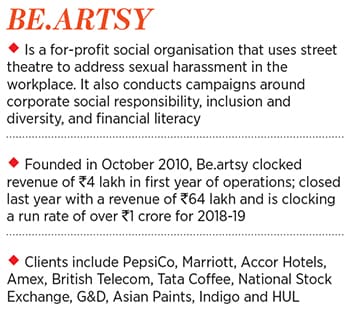Shikha Mittal: Confronting sexual harassment head-on
The victim-turned-crusader against sexual harassment at the workplace uses art to sensitise company employees



Image: Madhu Kapparath
Shikha Mittal
Age: 35
Entrepreneur
On a chilly winter morning in February, Shikha Mittal is getting ready to launch a ‘surgical strike.’ Addressing her troop of over a dozen ‘foot-soldiers’ in Delhi—all dressed in colourful jackets, ripped jeans, bright sweaters, and armed with tambourines, flutes and drums—Mittal breaks into a pep talk. “How is the josh?” asks the 35-year-old, borrowing a punchline from the Hindi film Uri. “High, ma’am,” her ‘army’ shouts.
The deafening cheer from the mix of spirited young men and women reverberates in the small neighbourhood park in South Delhi’s Greater Kailash colony. A handful of morning joggers find it amusing. Those practising laughter yoga take a break and stare at the bunch, which looks like a street theatre group rehearsing before the main act.
2019 W-Power Trailblazers list
Meanwhile, Mittal draws another uncanny parallel with Uri, a film based on India’s supposed ‘surgical strikes’ on Pakistan in 2016. “We never started it,” she says, alluding to unprovoked aggression of a different kind: Sexual harassment at the workplace. “But we will bloody well finish it.” Mittal is the founder of Be.artsy, a for-profit social organisation that uses skits and theatre to create awareness against sexual harassment at the workplace.
“It’s not okay to tolerate,” Mittal stresses, as she ends her brief motivational session. People in the street play group throw their clenched fists in air and shout ‘Jai Hind’, before heading to the corporate office of a foreign bank in Gurugram to conduct an awareness session.
Retreating into her one-bedroom rented apartment in Greater Kailash, Mittal elaborates how women have to fight every day at the workplace to keep sexual predators at bay.
The passion that helps her champion this cause, and take it from strength to strengh, perhaps comes from the fact that Mittal has had to quit as many as 14 jobs in six years—between 2004 and 2010—most of them due to sexual harassment, and has recently come out of a troubled marriage.
Disillusioned with the corporate world, Mittal turned entrepreneur in early 2010 by starting a not-for-profit organisation called Be.cause, which was geared to facilitate cultural exchange between the Commonwealth nations. The idea, she believes, was way ahead of its time within six months, the venture shuttered.
Though the failure might have been due to the business model that couldn’t find many takers, there was something more to it. Mittal was yet to come to terms with her troubled past. A streak of sexual harassment incidents still haunted her. “I was running away from the ghost. But I forgot that the best way to fight it is to confront it head-on,” she recounts, adding that a street play on kachra (garbage) became a turning point in her life.
Dump the ‘garbage’
In 2010, Mittal chanced upon a street play by the dramatics society of the Hindu College in North Delhi. Though it was themed around sanitation awareness, Mittal realised that the garbage in her life—sexual harassment—needed to be done away with too. “The only way I could do this was to create awareness against sexual harassment among corporates by using art as a weapon,” she recounts.  Be.artsy was rolled out in October 2010. Over eight years into the venture, Mittal is set to close the 2019 March-ending fiscal with revenue of over ₹1 crore, and counts PepsiCo, Amex, Vodafone, British Telecom and Tata Coffee among clients.
Be.artsy was rolled out in October 2010. Over eight years into the venture, Mittal is set to close the 2019 March-ending fiscal with revenue of over ₹1 crore, and counts PepsiCo, Amex, Vodafone, British Telecom and Tata Coffee among clients.
The journey, though, has not been easy, largely for two reasons. One, few companies spoke about sexual harassment, and victims rarely came out. Two, it was a tough task to make companies realise the need to sensitise their workforce, as sexual harassment was not considered to be a problem big enough for companies to allocate financial resources. Interestingly, after two years of struggle, PepsiCo offered Mittal her first big break in 2013.
“Be.artsy played a critical role in our diversity and inclusion journey to points out Pavitra Singh, human resource director (talent acquisition) for PepsiCo, Asia, Middle East and North Africa. Art, she continues, is a beautiful and powerful form of expressing without any biases. “I was blown away with the impact of street theatre and how it could be used so well to communicate in the corporate world.”
PepsiCo initially leveraged street theatre to create awareness about gender stereotypes. Mittal’s campaign, titled Mind Bugs, was designed to playback everyday situations at work where individual biases come to the fore. It was performed several times for internal audiences, as well as externally for other corporates. Buoyed by the feedback, the beverage giant expanded the scope of training and started to also build awareness on sexual harrassment at the workplace. The play was also translated into nine languages in order to connect with frontline employees. “The response was overwhelming. It not only sparked dialogues but also brought about a deeper behaviour change,” recalls Singh, adding that the campaign won the prestigious Global Harvey C Russell Inclusion Award, which is named after a member of the all-black sales force that was created in 1947 to sell Pepsi to the African-American community. Russell later became vice president of the US multinational in 1962. The journey of Be.artsy, says Singh, has been moulded by what Mittal had experienced in her professional and personal life. “It hasn’t been easy for her, but she has always hunted for light at the end of the tunnel,” Singh adds.
Not okay to keep quiet
Mittal first faced sexual harassment as an intern at a private FM radio station in Delhi in 2005. For the 21-year old history graduate from Khalsa College, who had a postgraduate diploma in mass communication from Bhartiya Vidya Bhawan, life was meant to be lived on one’s own terms. Dressing, for her, was always a part of one’s personality and mindset. Unfortunately, her short skirt was misconstrued by her 50-year-old senior as a ‘soft signal’.
Mittal shrugged off the initial suggestive remarks, which only emboldened her boss. One evening, on her way back after a client meeting in his car, she suddenly felt a hand on her thigh. Mittal froze, tried to push the hand away and jumped out of the car at the first red light. With tears rolling down her cheeks, she took an auto and rushed home. “I couldn’t discuss it with my parents. I was scared. They could have told me not to work.” She left her internship without informing anybody at her office. “I was too naïve. I thought he was a senior guy and nobody would believe me.”
At her second job, in 2006, Shikha’s ‘way of dressing’ became a subject of gossip among male colleagues. “After a year or so, I couldn’t take their crap anymore and quit.” At the third job with an event management company, her boss asked her to sleep with him. This time, Shikha mustered the courage to lodge a complaint. “But I was told that my boss gets business worth lakhs every month. So either I had to tolerate, or quit,” she says. Over the next five years, the same script played out, with the same results.
Shikha finally quit the corporate world in 2010 and decided to do something of her own. Sunieta Ojha, a Supreme Court lawyer who coordinates with Mittal on cases of sexual harassment at workplaces, says that her grit as an entrepreneur is largely due to the fact that a survivor has turned into a crusader. “The same corporate world that forced her to change multiple jobs now invites her to speak to their employees and sensitise them about laws on sexual harassment,” adds Ojha.
Mittal feels she may have blundered by not speaking out in the past. “It’s not okay to stay victim. Speak out whenever it [harassment] happens. At that moment, at that time.”
First Published: Mar 08, 2019, 11:31
Subscribe Now